Michael Brown and Ezell Ford are the latest unarmed African-Americans to be killed by police in a narrative that has become all too familiar -- and has sparked outrage across the country. As Brown's community in Ferguson, Missouri, has taken to the streets in largely peaceful protests, demonstrators nationwide also came together in an effort to put an end to police brutality and killings of unarmed black citizens.
On Thursday, cities across the country hosted National Moment Of Silence demonstrations honoring victims killed by the police.
The event, described on the NMOS14 Facebook page, served as a peaceful observation of police violence and an effort to move toward a solution nationwide:
Today is the National Moment of Silence for Victims of Police Brutality. We will peacefully assemble at over 90 vigils across the nation to share in a moment of silence and solidarity with each other. Today, we will show the world and each other that we can come together, as ONE.
The Huffington Post attended vigils in New York, San Francisco, Oakland, Detroit, Chicago, and Denver and spoke to participants about why they chose to attend the demonstrations.
New York: Bedford-Stuyvesant, Brooklyn
 Photo credit: The Huffington Post / Inae Oh
Photo credit: The Huffington Post / Inae Oh
“I decided to come today because this is my community. I'm from Brooklyn and live here in Bed-Study, Crown Heights. I thought it was important for we as a community to reflect on what's been happening nationally, but also bond together and look at each other and say, 'You are my neighbor, how can we help each other?' And I'm actually impressed with the conversation going on right now because that's what it's really about: how do we as a community bond together and make sure that we're safe and continue to build as change has happened here in this community as well?” - Artesia Balthrop
 Photo credit: The Huffington Post / Inae Oh
Photo credit: The Huffington Post / Inae Oh
 Photo credit: The Huffington Post / Inae Oh
Photo credit: The Huffington Post / Inae Oh
“I'm here because I live in the neighborhood and because this seems to be some sort of a flash point in terms of people being actually aware of something that's been going on for a long time, and it's a systematic problem. I think we as a community need to reject the current narrative of safety and security. Especially we as white people living in diverse communities. Shooting my neighbors, shooting unarmed people on the streets, shooting my friends does not make me safer.” - Josephine Stewart
 Photo credit: The Huffington Post / Inae Oh
Photo credit: The Huffington Post / Inae Oh
“I'm from St. Louis so I have a lot of family that's still there. So this hits close to home. We have to hold police accountable for their actions, just as much as any other person, as any public servant. It's unfair that black lives have historically been considered less than the lives of specifically white people. It's painful and I wish this was a peaceful march, perhaps to the police station, of some sorts -- a sort of show of solidarity with what's happening in Ferguson. Because what's happening in Ferguson is real and dangerous. The police state that exists in Ferguson right now is a real problem. ...This is nothing new. The systematic destruction of the black community by the police is nothing new. So every time this happens, we get together in a rally but then nothing happens. I'm hoping something sticks. We need to remind everyone this is still happening. I don't want to be peaceful anymore.” - Brandon Burton
 Photo credit: The Huffington Post / Inae Oh
Photo credit: The Huffington Post / Inae Oh
“It hits home because of course I'm a black man who grew up in America. It's come to a point that it's a slap in the face to us as black people and as black man. It's at a boiling point and we're all fed up with it.” - Jelani Brooks
 Photo credit: The Huffington Post / Inae Oh
Photo credit: The Huffington Post / Inae Oh
Detroit Photo credit: The Huffington Post / Kate Abbey-Lambertz
Photo credit: The Huffington Post / Kate Abbey-Lambertz
 Photo credit: The Huffington Post / Kate Abbey-Lambertz
Photo credit: The Huffington Post / Kate Abbey-Lambertz
Daryl and Kristine Ludy with daughter Isabella, 4, above, attend the Detroit National Moment of Silence vigil. They are holding their Missouri drivers licenses. Their hometown is just miles away from Ferguson, where 18-year-old Michael Brown was shot by a police officer this week.
"It's so powerful to us because we both have been victims of the same type of violence, not to the death, but he's been harassed," Kristine said.
Daryl spoke of getting stopped by police as a kid as an ordinary occurrence.
"I can recall just walking from my mother's house, going to see my friend and just getting stopped at night by an officer," he said. "Something simple with him just saying, like, 'Where do you live,you fit the description of a robbery.' I was always taught to just stay calm ... because things could get out of hand."
"We didn't want [our daughter] to see color," Kristin said. "Even though she will see it, we wanted … to be able to let her grow up and experience people and love them just for them."
 Photo credit: The Huffington Post / Kate Abbey-Lambertz
Photo credit: The Huffington Post / Kate Abbey-Lambertz
Poet Natasha "T" Miller, above, took the stage in front of a few hundred people to read a poem "for black girls who look like black men," saying she wanted to speak for the dead that people don't talk about. The subject resonates in Detroit, where in recent years several transgender women's murders have received little media attention.
Before reading, however, Miller prefaced her work with a personal story about how black victims become vilified in death.
"My brother was killed in Detroit, and I showed up to the crime scene and he was still laying up under his truck," Miller told the crowd. "He had just been killed, maybe like 40 minutes before, and the first thing the officer asked me when I arrived was, 'What did your brother do for a living?' and I told the officer, 'You're not going to incriminate my brother for his own death while he's still lying dead up under this truck.' … I tell that story to say this: nobody wants to be held accountable for the death of black men. And when you leave here, please leave with the desire to hold somebody accountable for the death of my brother, and your brother and so many other brothers."
 Photo credit: The Huffington Post / Kate Abbey-Lambertz
Photo credit: The Huffington Post / Kate Abbey-Lambertz
Jordan Rome, 21, lives in Chicago but grew up in Detroit. She attended the rally Thursday, in part because she's "fed up."
Rome talked about experiencing racism through "microaggressions, simple comments you don't even realize because we're so desensitized to racism, being told you don't act black enough, little comments like that."
"At the end of the day, I'm still perceived through a certain lens because of my skin color," Rome said.
 Photo credit: The Huffington Post / Kate Abbey-Lambertz
Photo credit: The Huffington Post / Kate Abbey-Lambertz
Monica Blaire, above, closes her eyes during the moment of silence at the Detroit vigil. Later, she sang the hymn "His Eye Is on the Sparrow" for the hundreds amassed in Hart PlazaThursday night.
Oakland Photo credit: The Huffington Post / Michael McLaughlin
Photo credit: The Huffington Post / Michael McLaughlin
Approximately 400-500 people showed up at Oakland's Frank Ogawa Plaza directly next to City Hall on Thursday. Arm bands were given out by activists to crowd along with signs that read, "Jail killer cops" and "Stop police brutality." The large crowd was most unified and vocal during chants of, "Hands up, don't shoot" and "Black lives matter." The event began with organizers calling out names of the victims Michael Brown, Oscar Grant, Eric Garner and others. The audience was then asked to shout out names of other victims of police brutality. Speakers specifically referenced local examples of excessive police force like Oscar Grant and Alan Blueford.
 Photo credit: The Huffington Post / Michael McLaughlin
Photo credit: The Huffington Post / Michael McLaughlin
Keisha Eldridge of Alameda, above, brought her 14-year-old-son and 3-year-old daughter.
"I felt like young black men in the streets are not important to police and sometimes to each other," she said. "This is to remind [my son] that his life is important."
Her son Jacob Talbot said "I felt like it wasn't fair and it wasn't right," what happened to Brown.
San Francisco Photo credit: The Huffington Post/ Lydia O'Connor
Photo credit: The Huffington Post/ Lydia O'Connor
Kristin Vogel is a San Francisco organizer and self-proclaimed “white ally to people of color,” who teaches sixth grade in San Bruno.
“I’m a middle school teacher and teach a lot of students who aren’t that much younger than Mike Brown," she said "I owe it to them.”
“I had a lot of students come in during the George Zimmerman trial, asking, ‘Why did he shoot that kid? What did that kid do?’ We just had really raw, honest conversations. I told them he didn’t do anything and it was just hate, ignorance, and it was a very difficult topic to talk to 12-year-olds about, but I want my students of color to fully understand that we live in a free country, but some of us are a little bit more free than others. That’s a sad thing to have to tell very optimistic 12-year-old about.”
 Photo credit: The Huffington Post/ Lydia O'Connor
Photo credit: The Huffington Post/ Lydia O'Connor
Savannah McCoy is a 17-year-old black senior at San Rafael High School. She wore a Trayvon Martin shirt and cried while explaining why she attended the vigil.
“Even though I don’t know Trayvon Martin or Eric Garner or Michael Brown, I still relate to them and I feel like in a way that they’re my brother or cousin, and when another one of them is shot, it’s like I’m losing a family member," she said.
"Everyone knows that Robin Williams just died, but they don’t know that in Ferguson, people are being shot by rubber guns, and they don’t care, and it really bothers me, so I’m having a protest on Saturday (at her high school). ...I do deal with a lot of racism and prejudice pretty much on a daily basis."
Savannah's best friend is Kimber Camgros, a 16-year-old student in her last year at San Rafael High School and an “ally to people of color.”
"Robin Williams just killed himself. ...All our schoolmates, that’s all anyone can talk about, and it’s like, when someone commits suicide that’s a terrible thing, but when someone’s being murdered when they’re innocent, for no reason, just on the street, and it’s a kid... people just don’t care enough," said Camgros.
Chicago
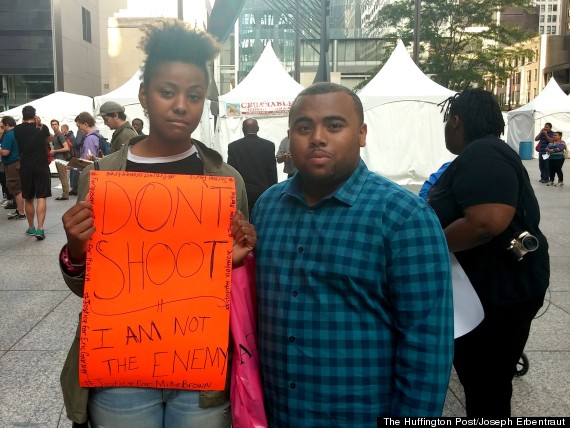 Photo credit: The Huffington Post / Joseph Erbentraut
Photo credit: The Huffington Post / Joseph Erbentraut
"I feel like it could have been me, actually," explained Jasmine Lomax, 18, above left, who lives in Chicago's South Shore neighborhood. "I don't live in that safe of a neighborhood and it would have been so easy for a police officer to stop me and accuse me of doing something wrong even if I was just walking and then just to shoot me dead."
"There's so many people around doing horrible things, shooting and killing people, but this kid was going to college, he wasn't doing anything wrong," Lamar Gayles, 17, of Woodlawn, said. "He was just going to the store and buying something."
"The footage reminded me so much of the Martin Luther King marches," Lomax continued. "If you watch those tapes, it's the exact same thing. I thought protesting was protected by our constitution and they're demonstrating peacefully and being attacked. It's gone too far."
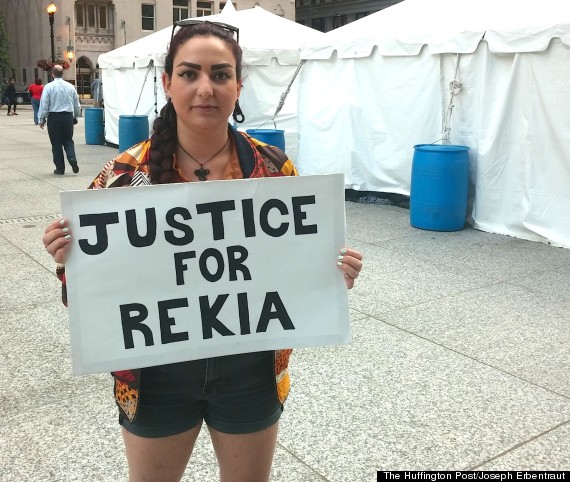 Photo credit: The Huffington Post / Joseph Erbentraut
Photo credit: The Huffington Post / Joseph Erbentraut
Netiya Shiner, 20, came to the Chicago vigil with another victim of police brutality on her mind.
"Two years ago, the sister of an acquaintance of mine, Rekia Boyd, was murdered while completely unarmed by the Chicago police," Shiner told HuffPost.
"People have been blowing up my Facebook feed with these posts about Ferguson which I think is a good thing in the long haul in that it means people are opening up the dialogue about racism and police brutality in this country," Shiner continued. "But [Boyd's murder] happened in the city and there was not any kind of response like what's going on with Ferguson now. The bottom line for me is that it's awesome that people are waking up and realizing what's going on but this has been happening for a very long time."
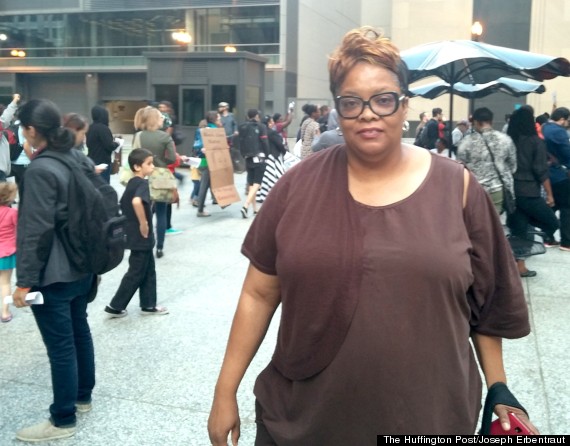 Photo credit: The Huffington Post / Joseph Erbentraut
Photo credit: The Huffington Post / Joseph Erbentraut
Martese Chism lives in Chicago and works at Cook County Stroger Hospital, where she's seen parents going through losing their children to violence. She fears the same thing could happen to her family members.
"I have a lot of young nephews and when I think about Michael Brown, they're not involved in gangs just like Michael and I'm worried that the same thing could happen to them because they're always walking to the store alone and I have the thought that someone would pull them over, grab them and kill them. That's what brought me here."
"My nephews live in the south and they want to come live with me and I want them to come live with me but I'm afraid for their safety and that's sad. I'm too afraid to bring them here. When I was a kid growing up we used to come every summer to Chicago, me and my brothers, but now it's not safe for my nephews to come visit me. That really bothers me."
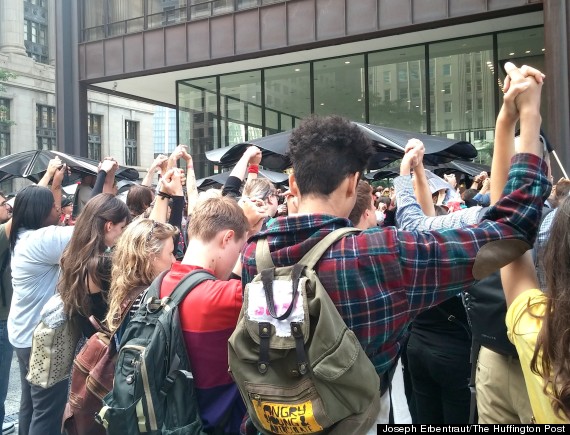 Photo credit: The Huffington Post / Joseph Erbentraut
Photo credit: The Huffington Post / Joseph Erbentraut
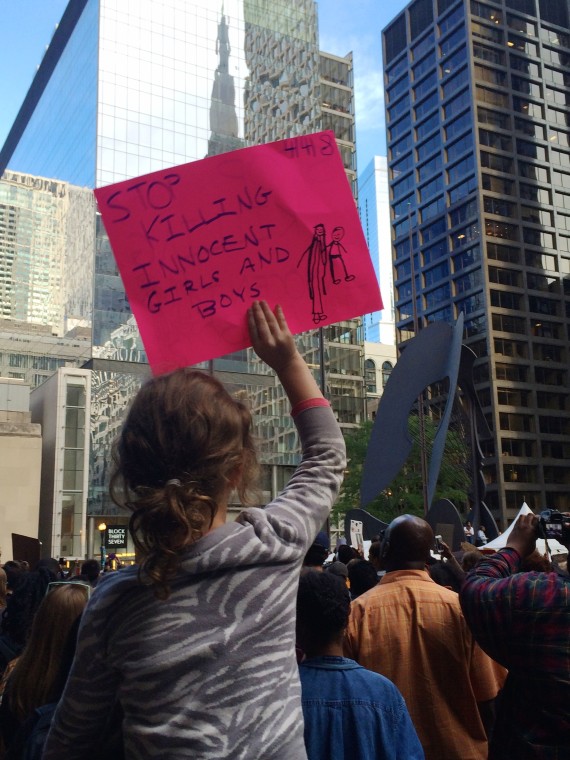 Photo credit: The Huffington Post / Kim Bellware
Photo credit: The Huffington Post / Kim Bellware
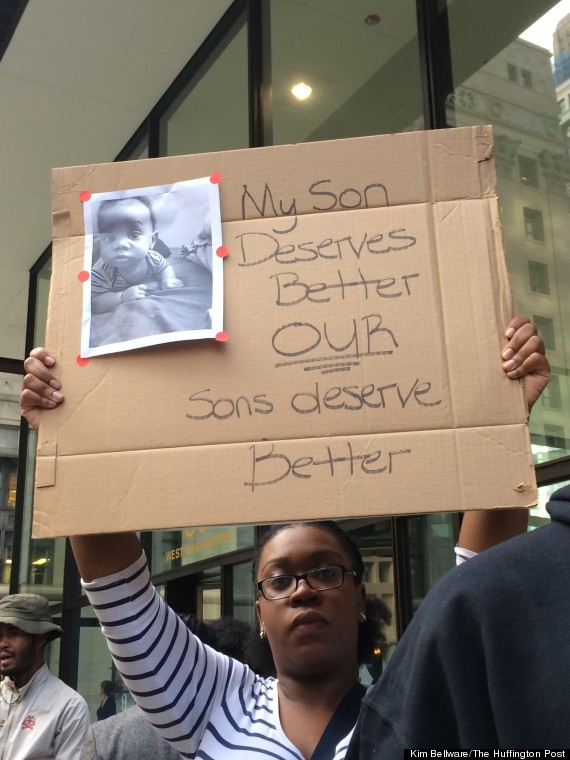 Photo credit: The Huffington Post / Kim Bellware
Photo credit: The Huffington Post / Kim Bellware
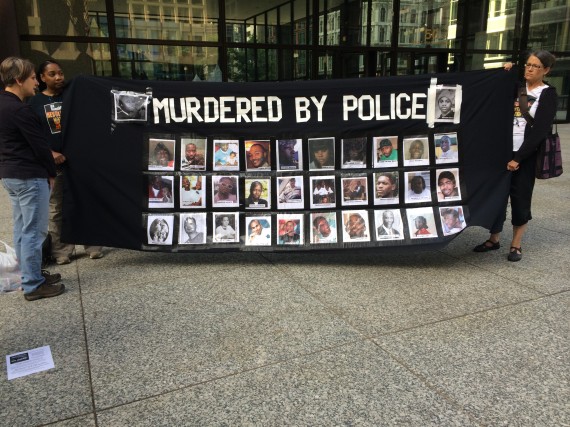 Photo credit: The Huffington Post / Kim Bellware
Photo credit: The Huffington Post / Kim Bellware
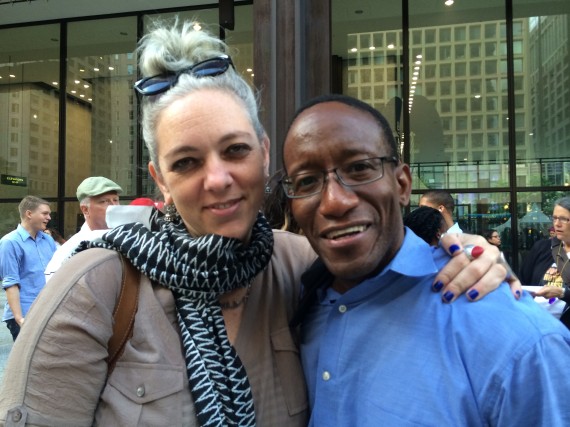 Photo credit: The Huffington Post / Kim Bellware
Photo credit: The Huffington Post / Kim Bellware
"Why I'm so rooted in this is because I have a 19-year-old daughter who's at the University of Alabama, doing very well. She grew up here in Chicago, and turned down my offer to help connect her with jobs for the summer. She said 'I don't want to get shot.' It's riveting for me to hear from my own blood that she doesn't want to come home. These organized efforts need to continue with the young generation. This needs to have not just protest but action steps. I'm very encouraged by the youth here." - Ernest Sanders, 50, above
"I'm grieving. I'm disturbed. I was on the train three days ago and overheard two white women talk about Ferguson and one said 'I'm so glad that doesn't affect us.' I think I came out because Mike Brown's murder has a racial dynamic, but we're also dealing with a police state. How can non-black and non-brown people not think this affects them? We're all susceptible to it. You don't know when it's coming to you. At the end of the day, we're all complicit with our silence." - Amanda Lichtenstein, 38, above
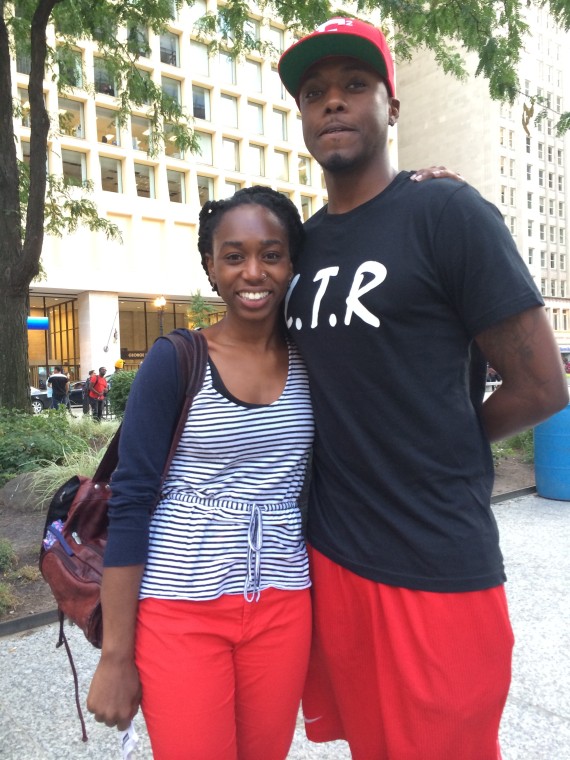 Photo credit: The Huffington Post / Kim Bellware
Photo credit: The Huffington Post / Kim Bellware
"I'm absolutely not surprised [by Ferguson]. We were here a year ago for Trayvon Martin and nothing has changed!.. My grandmother lives in the neighborhood [where the Ferguson protests occurred]. She's scared to come out of her house because of the military police." - Brittany Evans, 25
"We're looking at the situation and we need to stand up and say something. And with social media, people are noticing everything faster and faster." - Milan Franklin, 26, above
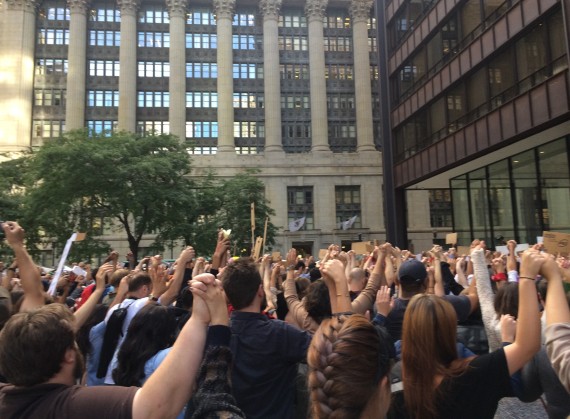 Photo credit: The Huffington Post / Kim Bellware
Photo credit: The Huffington Post / Kim Bellware
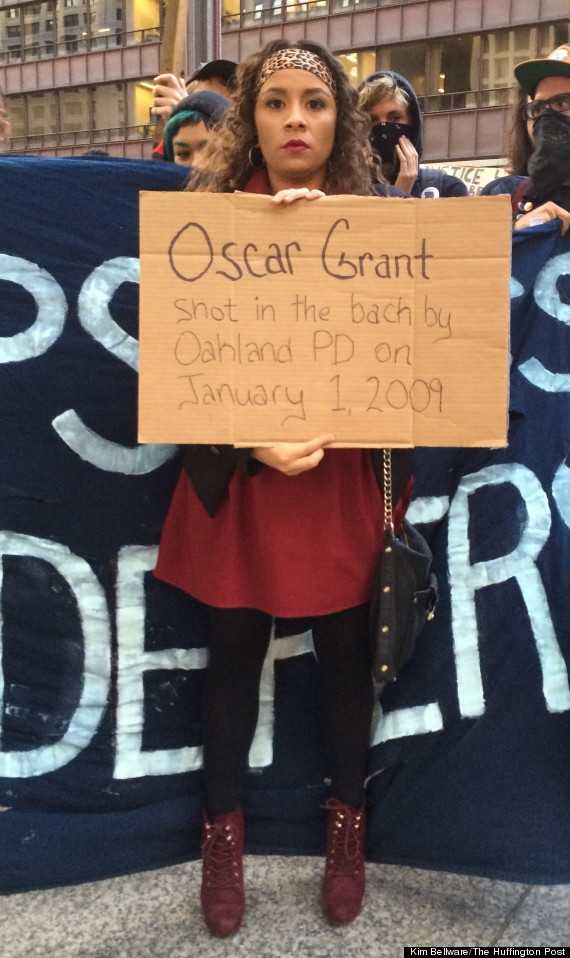 Photo credit: The Huffington Post / Kim Bellware
Photo credit: The Huffington Post / Kim Bellware
Rose Chavira, 26, is a Chicago Public School teacher who works with kids in grades 3-5 on the city's West Side.
"I'm a Chicago Public School teacher and I have kids in 3-5 grade. I've had a lot of incidents where students have been gunned down -- four students this summer alone. We have to be the voice for our kids," she said.
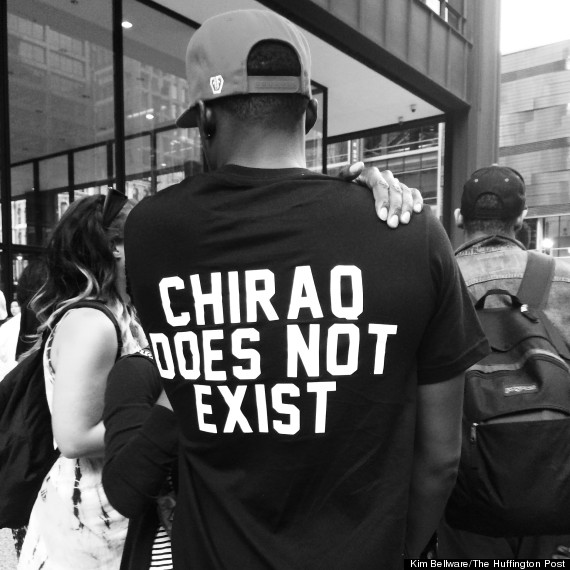 Photo credit: The Huffington Post / Kim Bellware
Photo credit: The Huffington Post / Kim Bellware
Milan Franklin, 26, wears a t-shirt blasting the pejorative term "Chiraq" that has been used amid the city's struggle with gun violence.
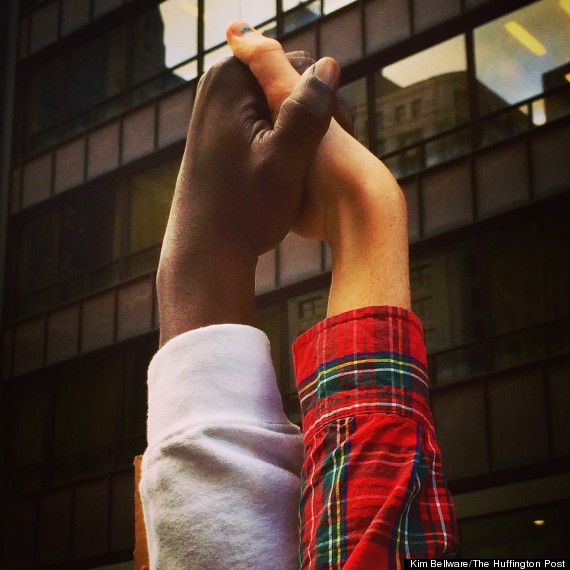 Photo credit: The Huffington Post / Kim Bellware
Photo credit: The Huffington Post / Kim Bellware
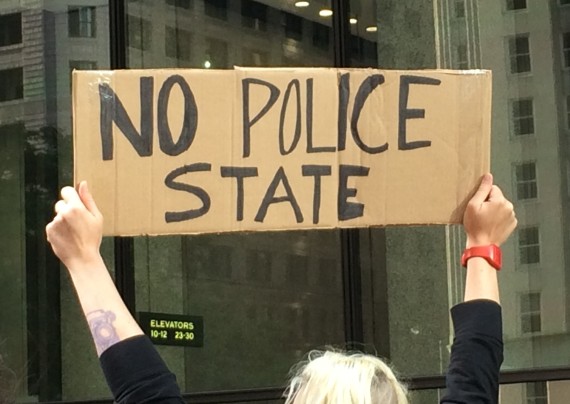 Photo credit: The Huffington Post / Kim Bellware
Photo credit: The Huffington Post / Kim Bellware
"I've lived [in Chicago] my whole life. I've never had anything escalate that bad -- but I have friends who have. But even when I get on the train, people tense up. But, it's good to see allies [at the vigil]. It's nice to see people who want to understand. There are even some very privileged people out here -- it gives me some hope." - Thaddeus Tukes, 20
"I think we're all here because we're fed up. It still pains you that you have to tell -- convince -- people that your life is valuable." - Sierra Boone, 19
Denver
 Photo credit: The Huffington Post / Ryan Grenoble
Photo credit: The Huffington Post / Ryan Grenoble
"I have a 5-year-old daughter, and she came to me with tears in her eyes as my grandmother called me from Missouri to let us know that she is alright. And she said, 'Why are the police trying to kill Grandma? Why are the police trying to kill you?' And to have that conversation is a difficult one. But I'm happy to say today, that if you look to your left and to your right, that here in Colorado we have community. And that we may not all look alike, we may not believe all of the same things, but our lives matter... If a young 5-year-old comes up to you, and asks you if their life matters, what will you say? Will your actions say the same thing?"
"Being black is not a crime. Being brown is not a crime. Being gay is not a crime. Not believing in the same political beliefs is not a crime. ...Our lives matter. And if we can say it here from the Rocky Mountains, from the Mile High City, that our lives matter, hopefully someone within ear will take heed." -- Reverend Quincy Shannon, above.
 Photo credit: The Huffington Post / Ryan Grenoble
Photo credit: The Huffington Post / Ryan Grenoble
"This isn't about black, this isn't about white, this isn't about Mexican. This is about police brutality against us, the people. We vote. We put them in. We pay them. How is it we have to protest?" - Preston Rubit, in black shirt second from right, above
 Photo credit: The Huffington Post / Ryan Grenoble
Photo credit: The Huffington Post / Ryan Grenoble
"We're asking for peace… peace for the people who are hurting. For these mothers and these fathers who will never see their children again. We're praying for a change in the system. We're praying for a healing in these communities, because in every one of these deaths, these people belong to a community. We're also asking for healing. Heal all of our hearts. Heal all of our minds.
"Give us the strength to continue to stand. To stand for justice. To stand as one." -- Reverend Terrence Hughes, above, Greater Denver Ministerial Alliance
 Photo credit: The Huffington Post / Ryan Grenoble
Photo credit: The Huffington Post / Ryan Grenoble
"Being black is not a criminal act. That's the message I want to send to anyone who is fearful of any black skinned person who is living in their own community, enjoying their own life, and stuck in the stereotypes of ignorance. Just because your pants sag does not mean you are guilty of a crime."
"Greatness comes from our city, and from where we are now. We can lead the way for others… There was a shooting yesterday. There have been shootings all this summer. But guess what? A young man was caught today in the Holly, running from the police, with a gun. And they did not kill that man today. We need to celebrate that. Whatever it was that made a police officer rest on his training, when a man has a gun, that man would be dead under any other circumstances." - Brother Jeff Fard, above center
 Photo credit: The Huffington Post / Ryan Grenoble
Photo credit: The Huffington Post / Ryan Grenoble
"I joined the movement for the National Moment of Silence because I have been saddened and horrified by the rampant examples of police brutality all over the world. I then realized that being sad or upset didn't mean much unless I followed it up with action.
"There were a series of tweets from four of us in Denver who felt moved to show to ourselves, our city and the country that Denver cares about the victims of police violence. I was particularly attracted to #NMOS14 because of its peaceful, reflective nature, and because these vigils nationwide are, in many cases, being planned by individuals instead of groups, and by people with varying levels of activist experience and community organizing.
"It's people who care. We care about the victims/memories, we care about honoring them, and we care about sending a quiet, peaceful message that all living beings matter to us. I was inspired by a portion of Dr. King's Letter from Birmingham Jail in which he called for a 'positive peace that is the presence of justice' instead of 'a negative peace which is the absence of tension.'
"We will be peaceful and reflective, and yet we are still showing up for justice." - Kenny Wiley, Director of Faith Formation Prairie Unitarian Universalist Church in Parker, CO and co-organizer of event, via email to The Huffington Post)
New York: Harlem
 Photo Credit: The Huffington Post / Christopher Mathias
Photo Credit: The Huffington Post / Christopher Mathias
"I'm here tonight because I represent an endangered species, which is black men in America," Cedrik Blue, a recording artist, told HuffPost Thursday evening in Harlem.
He says police have a long history of harassing him. Just yesterday, he says, NYPD cops singled him out for drinking in the street.
"I broke the law," he said. "I was drinking a beer in a brown bag standing in front of my studio, while there's damn near a party going on in someone's car four or five cars down from me." Blue said uniformed cops then jumped out of a taxi cab.
"Long story short, I'm glad I made it out alive", he continued. "Because I'm one of the few out of this endangered species that was breaking the law. I broke the law. I was drinking in public. But when you have guys doing absolutely nothing but leaving their house and going home, or going to work, or breaking up a fight, and they die, it's disgusting."
Blue lives with his fiancee, Kali Wilder, in Harlem. On nights that Blue gets home late, Wilder says she gets worried. She gets worried not because of criminals on the street, but because of how police treat young, black men in this country.
Her whole life, Wilder said, her black, male family members and friends have had to fear the police.
When a black boy reaches double digits in this country, she said, "They become a scary black man instead of a 10-year-old who's going to elementary school. You have to warn your children and say, 'Listen, watch how you're acting in the street.' I don't think white boys have that speech with their parents."
Christopher Mathias, Lydia O’Connor, Inae Oh, Kate Abbey-Lambertz, Joseph Erbentraut, Ryan Grenoble, Michael McLaughlin and Kim Bellware contributed to this report.
Before You Go










